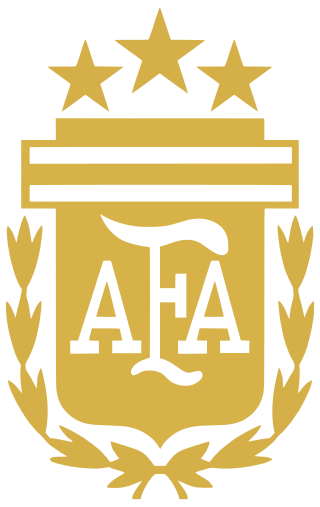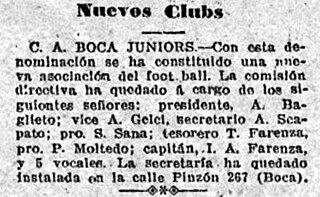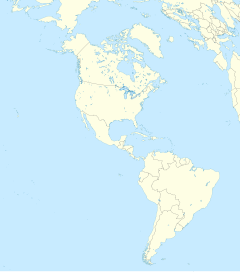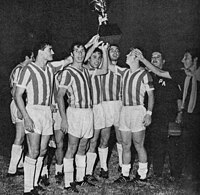
Club Atlético Boca Juniors, more commonly referred to as simply Boca Juniors, is an Argentine professional sports club based in La Boca, a neighbourhood of Buenos Aires. The club is best known for its men's professional football team which, since its promotion in 1913, has always played in the Argentine Primera División. The team has won 74 official titles, the most by any Argentine club. National titles won by Boca Juniors include 35 Primera División championships, and 17 domestic cups. Boca Juniors also owns an honorary title awarded by the Argentine Football Association for their successful tour of Europe in 1925.

The Argentina national football team, nicknamed La Albiceleste, represents Argentina in men's international football and is administered by the Argentine Football Association, the governing body for football in Argentina.

Club Atlético River Plate, commonly known as River Plate, is an Argentine professional sports club based in the Belgrano neighborhood of Buenos Aires. Founded in 1901, the club is named after the English name for the city's estuary, Río de la Plata. River's home stadium, Estadio Monumental, is the largest in South America. River had the highest average home attendance of any association football club in the world in 2023 with 84,567. With more than 350,000 members at the end of 2023, River is one of the largest sports clubs by membership.

Martín Palermo is an Argentine football manager and former player who played as a striker. He is currently the manager of Olimpia.

Club Cienciano, more commonly known as Cienciano, is a Peruvian professional football club based in Cusco, that currently plays in the Peruvian Primera División. It gained worldwide recognition after defeating River Plate in the finals of the 2003 Copa Sudamericana and Boca Juniors in the 2004 Recopa Sudamericana. The club is considered the largest and most successful in Cusco. Founded in 1901, the club is among the oldest in Peru and the oldest in Cusco.

Miguel Ángel Russo is an Argentine professional football manager and former player who played as a defensive midfielder. He is the manager of San Lorenzo.

Juan Carlos "Toto" Lorenzo was an Argentine football player and coach. He became an icon for Boca Juniors fans after he coached the club to its first two Copa Libertadores titles.

Marcelo Daniel Gallardo is an Argentine football manager and former professional player who is the current head coach of River Plate. During his playing career, Gallardo was an attacking midfielder and playmaker. He was regarded for his vision, technique, class, dribbling and especially his defence-splitting passing.

Superclásico is the football match in Argentina between Buenos Aires rivals Boca Juniors and River Plate. It derives from the Spanish usage of "clásico" to mean derby, with the prefix "super" used as the two clubs are the most popular and successful clubs in Argentine football. In fact, the term 'Clásico' originated in Argentina, particularly with this match up and it was later exported to other countries such as Spain and Mexico. According to some statistics, they command more than 70% of all Argentine football fans between them.

The Copa Libertadores is the most important international football club competition in South America. Throughout the history of the tournament, 25 teams from seven countries have won the competition. Its rich history has been saturated with many legendary matches, iconic players and exceptional teams; from Peñarol's historical consecration in 1960, to Coutinho and Pelé enchanting the world with Santos's magical football, down to Estudiantes's unlikely success at the end of the 1960s, and Club Atlético Independiente being brought to glory in the utmost manner.

Boca Juniors Femenino is the women's football team of Argentine sports club Boca Juniors. Established in 1990, it has been the leading force in the Campeonato de Fútbol Femenino since the late 1990s, having won 27 editions of the competition, including a ten-years streak winning both the Apertura and Clausura championships. Former men's squad player Juan Román Riquelme is in charge of the section since the beginning of 2020.

The origins of Argentine sports club Boca Juniors can be traced to the early 1900s, when a group of teenagers decided to establish a football club in La Boca, a working-class neighborhood of Buenos Aires. Most of the original founders of the club were of Italian descent, as the southern barrio had been settled by Ligurian migrants during the 19th century; to this day, Boca supporters are known as "Xeneizes".

Nahuel Molina Lucero is an Argentine professional footballer who plays as a right-back or right wing-back for La Liga club Atlético Madrid and the Argentina national team.
The 2017–18 Argentine Primera División - Superliga Argentina was the 128th season of top-flight professional football in Argentina. The season began on 25 August 2017 and ended on 14 May 2018.

The 2018 Copa Libertadores finals was the two-legged final to decide the winners of the 2018 Copa Libertadores, the 59th edition of the Copa Libertadores, South America's premier international club football tournament organised by CONMEBOL.

The Argentina–Uruguay football rivalry, also known as Clásico del Río de la Plata, is a highly competitive sports rivalry that exists between the Argentine and Uruguayan national football teams and their respective set of fans. Considered by football journalists and fans alike as one of the most important rivalries in the sport, the derby is also the most played in football history. According to FIFA records, 197 official matches have been played to date, the first of which was played on 20 July 1902, in which both teams played the first international match outside the United Kingdom in Uruguay, with Argentina winning by 6–0.

The 2019 Copa de la Superliga Final was the 49th and final match of the 2019 Copa de la Superliga. It was played on 2 June 2019 at the Estadio Mario Alberto Kempes in Córdoba between Tigre and Boca Juniors.
Ignacio Ezequiel Agustín Fernández Carballo, popularly known as Equi Fernández is an Argentine professional footballer who plays as a midfielder for Saudi Pro League club Al-Qadsiah.

The 1964 Mohamed V Cup Final was the 3rd. edition of the Mohammed V Cup, an annual football friendly competition hosted in Casablanca and named after King Mohammed V.

The 2022 Copa de la Liga Profesional final was the final match of the 2022 Copa de la Liga Profesional, the third edition of this national cup. It was held in the Estadio Mario Alberto Kempes in Córdoba on 22 May 2022 between Boca Juniors and Tigre.




















